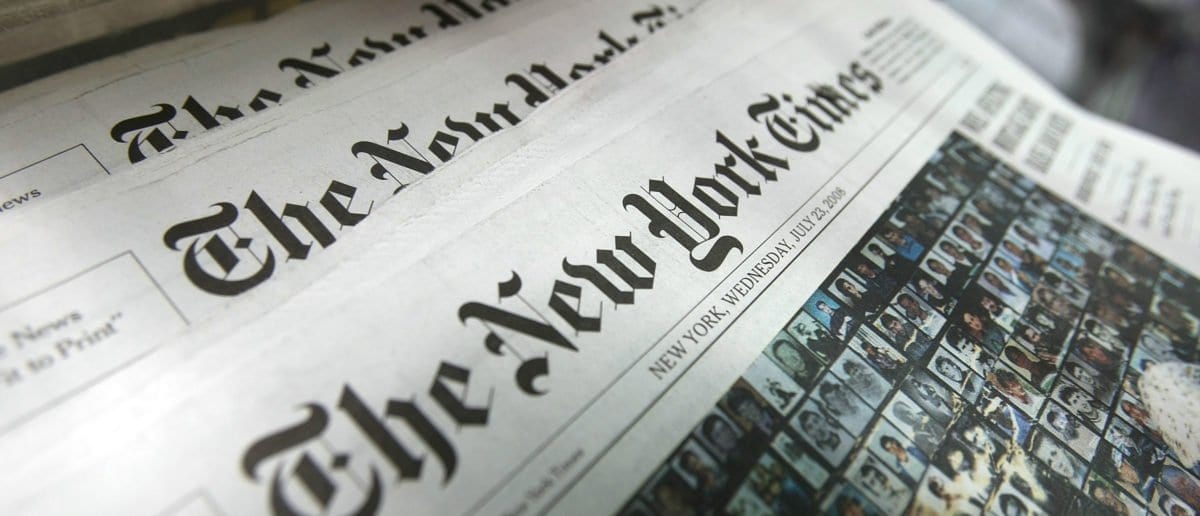 The New York Times launched a stunning defense against raising taxes on the wealthy in a news story Wednesday that seemed more like well-dressed opinion.
The New York Times launched a stunning defense against raising taxes on the wealthy in a news story Wednesday that seemed more like well-dressed opinion.
The chief complaint lodged by TheNYT news desk is that the Senate bill would strip a local and state income tax deduction, which would place the full weight of local taxes on the residents of New York City. If the rich people of NYC are forced to carry the entire tax load placed on them rather than depending on the feds to help out, the paper’s argument goes, all kinds of bad things could happen.
Here are five consequences the affluent in and around the city might “suffer†under this bill.
1. Rich people might not be able to send their kids to the most expensive schools in the country. TheNYT talked to a professor living in an affluent commuter town, who learned from Turbotax that if she has to actually pay her local and state taxes in addition to federal taxes, her bank account would take quite a hit.
“‘We’re worried and we’re wondering what are we going to tell our kids,’ said Cynthia Metcalf, who lives with her husband and the youngest of their four children in Mount Kisco, an affluent commuter town. … Ms. Metcalf said she dreaded the prospect of telling her youngest child, Genevieve, a high school senior, that the college of her choice was beyond their means.â€
2. Rich people might get upset at the prospect of forking over half their income to the government and leave. If the wealthy are forced to shoulder the full tax burden imposed on them by their local and state governments, TheNYT notes, they might pick up their money and leave those state and local governments with less to tax.
“For the wealthiest New Yorkers, meanwhile, the loss of the deduction for state and local taxes means they could face a combined tax rate above 50 percent on their income. Already, many wealthy New Yorkers try to spend enough time outside the city to avoid paying income taxes as state residents, and economists warn that the tax bill could accelerate that trend. …
It wouldn’t take a mass exodus to have a significant impact on state and local budgets. According to the city’s Independent Budget Office, fewer than 40,000 New Yorkers accounted for 45 percent of taxable income in New York City in 2014.â€
3. Even if they stay, they might not be so keen on the new taxes Democrat governors and mayors are already dreaming up. NYC Mayor Bill de Blasio and New Jersey Governor-elect Phil Murphy have big plans to spend federally subsidized money that could be put in jeopardy if the residents of New York have to be the ones to fork over the cash.
“Even if most rich New Yorkers stay put, local politicians could find it harder to raise taxes to pay for services. Mr. de Blasio, for example, has called for a tax on millionaires to help fix the city’s subway system. Mr. Murphy, the New Jersey governor-elect, wants a similar tax for public schools.â€
4. Houses in expensive areas might be more affordable. The Senate bill would do away with help from the federal government in shouldering the cost of owning homes and paying for property taxes, which would likely drive down demand (and the cost) for homes in expensive areas with high property taxes — i.e. NYC and the surrounding region. That’s bad news for wealthy property owners.
“An analysis of the Senate bill by Moody’s Analytics concluded that home prices in Manhattan could fall nearly 10 percent in the coming years because of the bill. Some New York and New Jersey suburbs could be even more vulnerable because property-tax rates are higher there and prices are still recovering from the bursting of the housing bubble.â€
5. The city will have to spend more of its own money to take care of the people who live there. New Yorkers wouldn’t be able to offload local and state taxes to the federal government under the bill, so state and local governments would have to make difficult choices about how to spend taxpayer money. They may have to cut government benefits, or pay for more of it themselves.
“‘The human impact is huge,’ Mr. de Blasio said, referring both to the higher taxes some residents would pay and to the services that could be cut as a result of the tax plan. He said his administration had tried for four years to make one of the world’s most expensive cities more affordable by providing public prekindergarten and paid sick leave. ‘And then along comes the federal government and makes the situation worse,’ he said.â€
TheNYT notes large swaths of the country will get a significant tax cut, including most New Yorkers, and acknowledges the potential economic boon to the city from the corporate tax cut proposed in the bill. But the piece insists this will be bad for the city. One expert is quoted ominously: “It’s not going to be good, I think that’s clear. And it might well be devastating.â€
Most of America isn’t at risk of being “devastated†in these ways, because most of the country doesn’t offload a massive local tax burden onto the federal government to begin with. Also large swaths of the country are getting a massive tax cut. But, sure, let’s focus on the rich people in Manhattan and wealthy NYC suburbs who could suddenly be forced to pay for their own taxes.
Send tips to rachel@
Read More
Content created by The Daily Caller News Foundation is available without charge to any eligible news publisher that can provide a large audience. For licensing opportunities of our original content, please contact [email protected].





